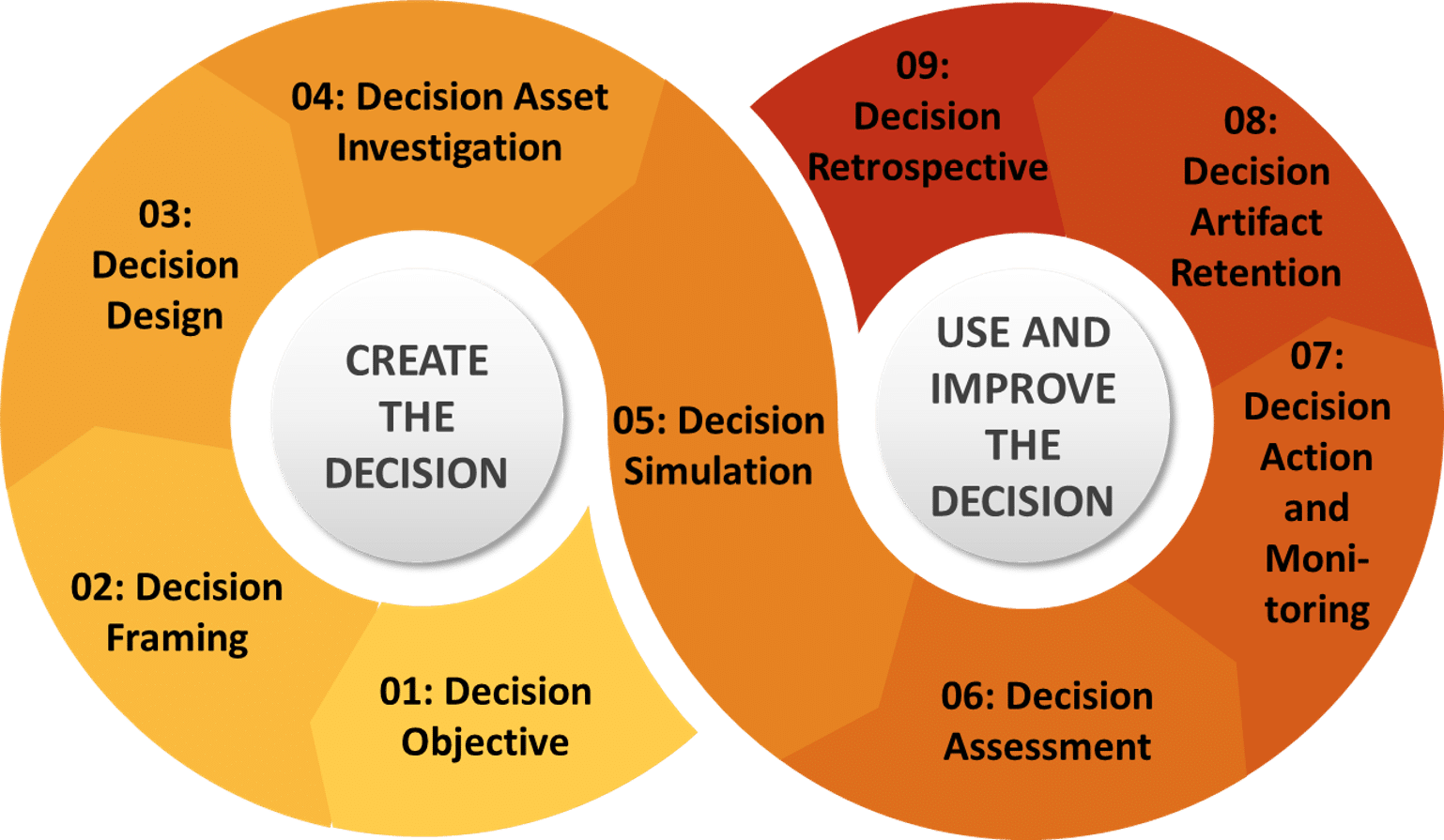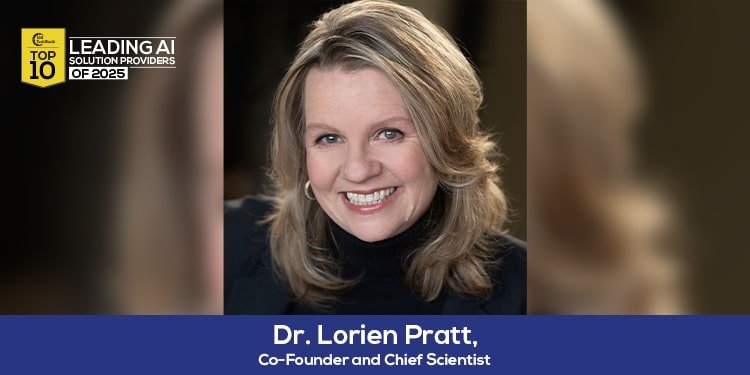Decision Intelligence is to AI what engineering is to physics: a bridge from raw technical knowledge to real-world, practical use. The origin of Decision Intelligence began when Dr. Lorien Pratt—an AI/CS PhD with deep roots in both research and industry, and who is known for inventing Transfer Learning—joined forces with Mark Zangari, then CTO of SPATIALinfo, Inc., and an accomplished software architect, designer, and developer.
Through the course of their careers, both had come to the same realization: despite decades of progress in AI and analytics, very little of it was being used by the people making high-stakes decisions. Decision Intelligence was their answer to this pressing gap.
To explore this decision-making philosophy further, the duo undertook a detailed study, interviewing dozens of decision makers at all levels of their organizations, across a wide range of industries, and from many countries. The findings were unambiguous: business intelligence—and AI in particular—had been barking up the wrong tree. Most executives weren’t looking for better predictions; they were looking for better outcomes.
Specifically, decision makers wanted to know: What actions can I take, given my current situation, to change the outcomes I care about? Pratt and Zangari found that the decision-making processes used by most leaders made little use of the deluge of data available to them. Instead, they relied heavily on mentally tracing the causal chains that linked possible actions to desired outcomes.
AI couldn’t do that. BI tools couldn’t either. Even causal AI—focused on extracting cause-and-effect from data—fell short, because the critical causal knowledge needed for sound decisions often resides in the minds of experienced people, not in any database.
That insight became the seed of Decision Intelligence. In 2010, Pratt and Zangari founded Quantellia and began developing a platform and methodology to transform causal reasoning into a practical business discipline.
Decision Intelligence rep
World Modeler: Operationalizing Decision Intelligence
Zangari led the development of Quantellia’s World Modeler Decision Intelligence Platform from the ground up to operationalize Decision Intelligence and empower organizations to take charge of the outcomes they seek.
World Modeler, which includes an agentic AI, helps organizations map their goals, identify the causal levers they can pull, and—like a business digital twin—simulate the ripple effects across their operations. It integrates smoothly with existing AI and analytics investments but reframes them in a decision-first context. “Like the invention of AI itself, the creation of Decision Intelligence is a foundational moment in the evolution of intelligent systems,” says Mark Zangari, Co-founder and CEO of Quantellia.
Mark Zangari: Like the invention of AI itself, the creation of Decision Intelligence is a foundational moment in the evolution of intelligent systems.
Unlike traditional AI, which assumes the future will mirror the past, World Modeler simulates outcomes based on how your decisions shape what comes next—even in unfamiliar territory. This is a substantial improvement to previous decision-making systems provided by machine learning and AI, which are built based on backward-facing, historical data. By modeling the real-world context of a specific choice, World Modeler enables analytics and modeling teams to deliver targeted, actionable recommendations, while giving business decision-makers the clarity they need to choose the best path forward.
“The story of Quantellia is the story of Decision Intelligence itself—how it emerged to fill a critical void, and how it now offers a way forward for anyone ready to move beyond dashboards and into the age of intelligent, outcome-driven action,” says Dr. Lorien Pratt, Co-founder and Chief Scientist of Quantellia. “AI taught us how to predict. Decision Intelligence teaches us how to act.”
World Modeler at Work
Most tools start with data. World Modeler starts with a purpose.
Quantellia’s platform begins with a simple but powerful question: What outcome do organizations want to achieve? Whether it’s increasing revenue, reducing churn, or improving sustainability, every model in the system is anchored to a specific goal—or set of goals. Those outcomes become the center of gravity for everything else.
From there, users identify the levers they control: the actions they can take. These might include investments, policies, staffing changes, marketing tactics, or operational adjustments.

Next comes the connective tissue: mapping how those actions influence intermediate drivers—conversion rates, cycle times, sentiment scores, and other KPIs—and how those, in turn, shape the desired outcome.
Crucially, human expertise is treated as a first-class input. Subject-matter experts can encode rules of thumb or known cause-and-effect relationships—factors often invisible in the data but vital for informed decision-making.
Once the causal map—called a Causal Decision Diagram (CDD)—is in place, it becomes a scaffold for discovering where data can support reasoning. Rendered as executable software, it allows the system to simulate scenarios, flag risks, recommend optimal combinations of actions, and do root-cause analysis if things don’t go as expected.
It doesn’t replace human judgment—it amplifies it, making every insight traceable to a goal and every decision explainable.
“This outcome-first approach is what makes Quantellia’s Decision Intelligence different. It’s not just about predicting what might happen. It’s about charting a path to make what should happen, happen,” remarks Zangari.
Creating Unparalleled User Experiences with LLM Integration
LLMs like ChatGPT play a powerful supporting role in World Modeler, helping users build better decision models—faster.
At the start of a project, an LLM can assist in creating the CDD by transforming natural language inputs—business goals, known drivers, stakeholder insights—into a draft decision map. This speeds up early modeling and helps capture institutional knowledge that might otherwise remain undocumented.
Once a model is in place, the LLM can also interpret results, explain the model’s structure, and clarify how data connects to business outcomes. In this way, it serves as an accessible bridge between technical complexity and stakeholder understanding.
Dr. Lorien Pratt: The story of Quantellia is the story of Decision Intelligence itself—how it emerged to fill a critical void, and how it now offers a way forward for anyone ready to move beyond dashboards and into the age of intelligent, outcome-driven action.
Quantellia is extending these capabilities to enable full conversational access to decision models. Users will be able to ask natural-language questions such as, “What’s causing the delay in customer onboarding?” or “Which lever has the most impact on Q4 revenue?” These features, now in development, reflect the company’s commitment to making Decision Intelligence more accessible and collaborative for every decision-maker.
“By blending causal reasoning with conversational AI, we’re not just creating smarter tools—we’re creating tools people can actually use, without a steep learning curve to get started,” says Zangari.
Delivering Desired Outcomes for Organizations
Quantellia works with organizations facing high-stakes, complex decisions—where multiple teams, metrics, and uncertainties intersect. The clientele includes Fortune 500 enterprises, governments, and mission-driven organizations across industries such as healthcare, finance, energy, education, agriculture, sports, and manufacturing.
The common thread among them: they aren’t just looking for more data. They’re looking for clarity—a way to align stakeholders, evaluate alternatives, and take confident action without drowning in complexity or relying on disconnected tools. And they need an easy-to-use way to get started, which can prove value quickly without an initial massive investment.
World Modeler is especially valuable for decision-makers operating in dynamic environments: Enterprise Architects guiding Fortune 500 organizations through a complex organizational maze, analytics leaders striving to turn insight into action, policymakers managing tradeoffs.
For example, a mid-sized airline runs ongoing social media campaigns, seasonal promotions for specific routes, and incentive programs for online travel agents. They want to understand how changes in the amount and timing of marketing spend impact sales, determine the best use of their budget, and optimize spend to hit revenue targets. With an interactive World Modeler simulation, powered by Decision Intelligence and AI, they can explore these scenarios, test tradeoffs, and make informed decisions with confidence.
The De Facto Tool to Desired Outcomes
“Our vision for Quantellia is simple: to lead the Decision Intelligence platform marketplace, making World Modeler the operating system of choice for strategic and operational actions in organizations worldwide,” says Zangari.
The company is expanding in three key directions.
First, it is growing an ecosystem—partnering with forward-thinking organizations, decision intelligence service providers, and consulting firms to put World Modeler into more hands, faster. It is also expanding globally, especially in regions where complexity and uncertainty are high and the need for better decisions is urgent.
Second, Quantellia is evolving its platform. It is deepening World Modeler’s integration with generative and agentic AI, developing self-service Decision Intelligence modeling capabilities, extending causal modeling templates, and enhancing automation to enable faster model building and broader adoption. The core, however, will remain the same: one decision at a time, grounded in outcomes, context, transparency, and trust.
Third, the company is investing in the community. “As co-founders of OpenDI.org, we’re helping shape the standards that define this field—ensuring interoperability, accountability, and shared learning across Decision Intelligence practitioners and platforms,” states Pratt.
In five years, Quantellia expects Decision Intelligence to be where AI is today: everywhere. “As DI pioneers, we see the company at the center of that movement—powering better outcomes through clarity, causality, and action, plus continuing to lead innovation in DI towards improving value for organizations worldwide,” concludes Zangari.
Discover more AI stories:
Backwell Tech Corp. Europe GmbH: Delivering Trustworthy AI Predictions that Maximize Profits
Wearable Technologies Inc. – Preventing Preventable Accidents, Saving Lives
Elevating the Everyday Hero with AI – The Power of WageUp Inc.

As a seasoned professional with over a decade of experience in technology and business magazine publication, I’ve had a front-row seat to witness the astounding pace at which the industry has evolved, often outstripping even Moore’s Law. My passion lies in crafting engaging technology articles that invite readers to immerse themselves in the dynamic and ever-changing world of technology. With each piece, I strive to create a window into this world, offering a glimpse of the amazing events and breakthroughs that continue to shape our future.










